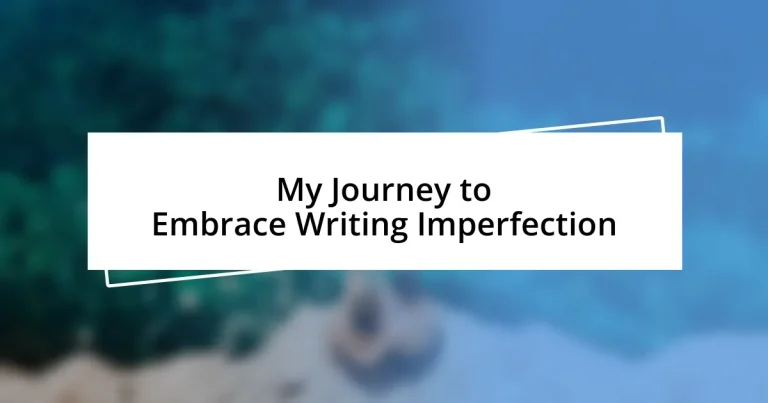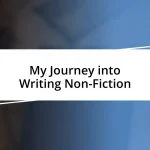Key takeaways:
- Fear of imperfection can hinder creativity; embracing vulnerability in sharing work often leads to positive feedback and connection.
- Practicing self-compassion, setting achievable goals, and seeking peer feedback can help overcome self-criticism.
- Accepting flaws and adopting a growth mindset transforms mistakes into learning opportunities, enhancing the writing journey.
- Building a supportive writing community fosters encouragement and shared experiences, making the writing process more fulfilling.
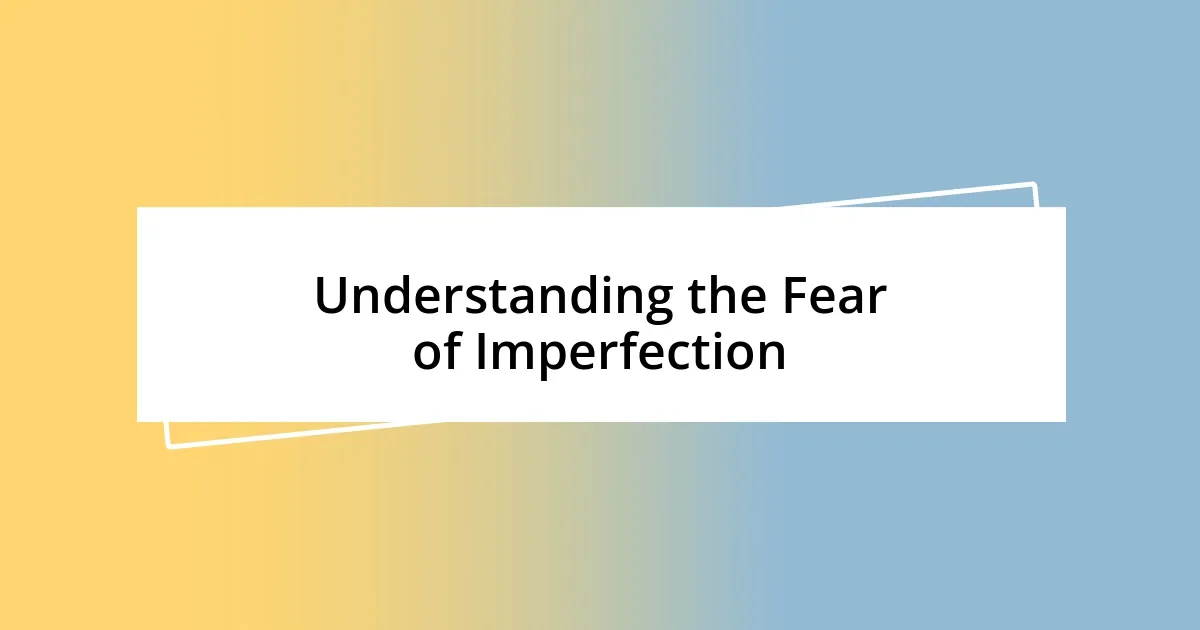
Understanding the Fear of Imperfection
Fear of imperfection can be paralyzing, and I’ve felt that weight many times. There was a period early in my writing journey when I would spend hours agonizing over a single paragraph, convinced that any flaw would derail my message. I often ask myself, “What if my words aren’t good enough?” But that question only fueled my anxieties instead of guiding me toward growth.
Sometimes, I imagine a world where imperfection is celebrated instead of feared. I recall a workshop where the instructor urged us to share our drafts without hesitation. Letting go of my need for perfection felt liberating and frightening all at once. Have you ever felt that rush of vulnerability when exposing your work? It’s a raw moment that can either uplift you or make you want to hide away.
Moreover, our obsession with perfection often comes from external pressures—social media, critics, or even our own unattainable standards. I once posted a piece that I thought was far from perfect, and despite my fears, the feedback was overwhelmingly positive. It made me realize that people resonate more with authentic expressions than flawless execution. Why do we hold ourselves to such rigid standards when our imperfections could connect us more deeply with others?
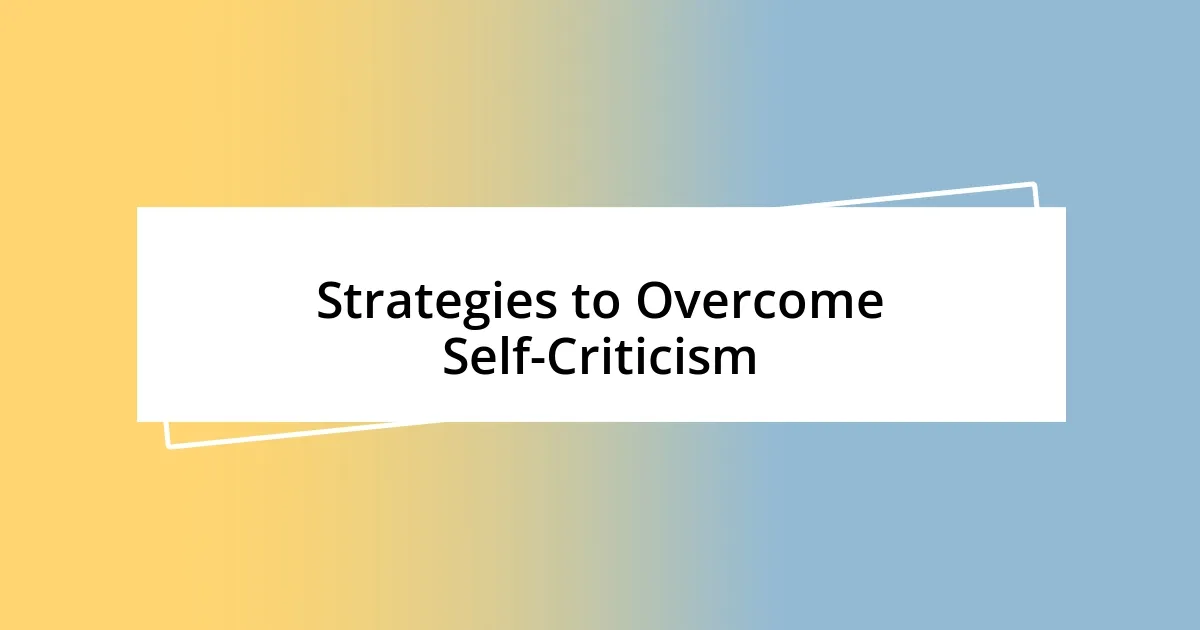
Strategies to Overcome Self-Criticism
Finding ways to quiet self-criticism is crucial for any writer. One effective strategy I’ve discovered is practicing self-compassion. I remember a time when I was editing a piece and felt utterly defeated by my internal monologue. Instead of spiraling into negative thoughts, I asked myself how I would comfort a friend facing the same situation. This shift in perspective allowed me to speak kindly to myself, reminding me that making mistakes is part of the creative journey.
Another method is setting specific, achievable goals rather than overwhelming yourself with vague expectations. I’ve learned to split my writing tasks into smaller, manageable chunks. For instance, instead of aiming to finish an entire chapter in one sitting, I focus on completing a paragraph or even just brainstorming ideas. This not only makes the process more enjoyable but also helps alleviate the self-imposed pressure to get everything perfect right away.
Lastly, seeking feedback from trusted peers can provide a fresh perspective. I recall a writing group I joined, where sharing drafts felt daunting at first. However, receiving constructive criticism in a supportive environment helped me see my work through new eyes. It transformed my fear of judgment into an opportunity for growth, turning self-criticism into constructive dialogue.
| Strategy | Description |
|---|---|
| Self-Compassion | Engage in kind self-talk, treating yourself as you would a friend facing similar struggles. |
| Set Achievable Goals | Break your writing tasks into smaller, manageable sections to ease pressure. |
| Seek Peer Feedback | Share your work with trusted peers for constructive criticism and support. |
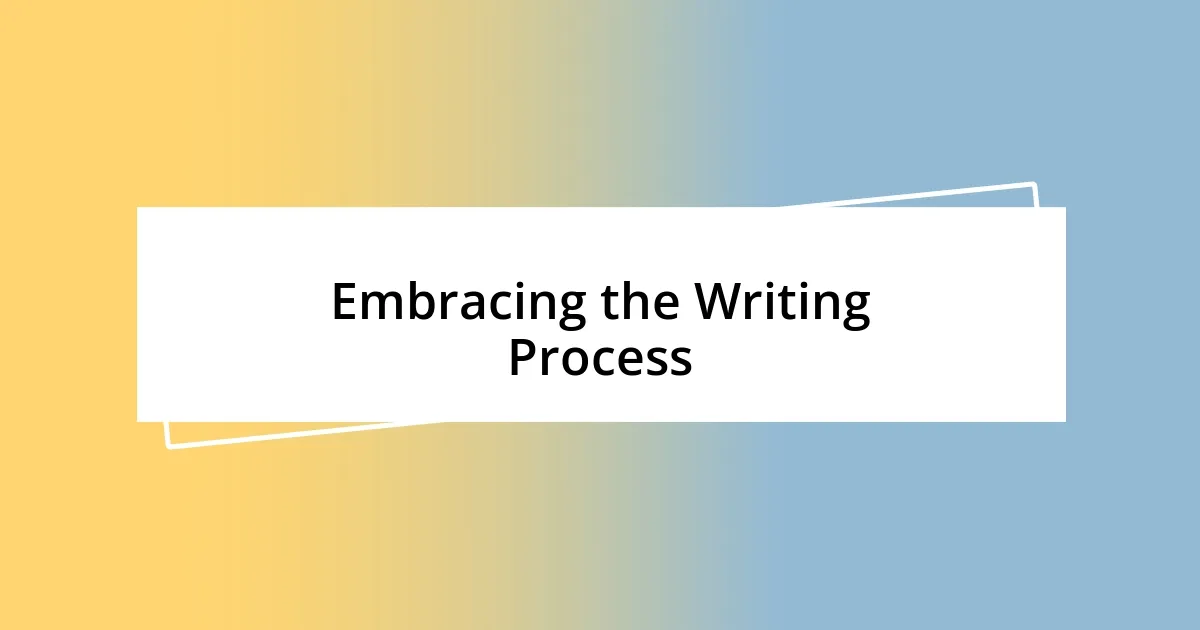
Embracing the Writing Process
Embracing the writing process means understanding it as a journey, not a destination. I’ve learned to appreciate that each draft is a stepping stone rather than a final product. It was during a writing retreat that I first encountered the idea of letting go, as we were encouraged to write without judgment for a whole hour. The experience was eye-opening; producing words on the page without self-restriction felt like opening a floodgate of creativity.
- Writing is messy—allow yourself to embrace the chaos.
- Each draft brings you closer to clarity; don’t fear the initial imperfections.
- Celebrate small victories, like completing a page or experimenting with a new style.
From that moment on, I stopped seeing each writing session as a test of my worth and instead recognized it as an opportunity for exploration. I often remind myself, “Every writer has to sift through the muck to find their gems.” The messy process is where the magic happens, and the more I lean into it, the more rewarding my writing evolves.

Techniques for Accepting Flaws
Accepting flaws can be quite a challenging endeavor, but I’ve found that maintaining a journal to express my thoughts has helped immensely. In this safe space, I jot down my writing fears and imperfections. When I revisit these entries, I often chuckle at my earlier concerns, realizing that those flaws were merely stepping stones to growth, not barriers. Have you ever thought that writing down your worries might make them feel less daunting?
Another technique I discovered is to celebrate my imperfections as part of my identity as a writer. Once, during a workshop, I shared a piece that I thought was riddled with flaws. Surprisingly, the group resonated with my raw honesty, and their positive feedback made me realize that vulnerability can be powerful. It’s truly liberating to accept that my unique voice—flaws and all—contributes to my writing’s authenticity. Why not embrace your imperfections too, and see how they can connect you with your readers?
Lastly, adopting a growth mindset has transformed how I view mistakes. Instead of seeing them as setbacks, I now treat them as invaluable learning experiences. I vividly remember after submitting a particularly rough draft, I received constructive feedback that, while initially stung, propelled me to deepen my understanding of my craft. It made me eager to revise and improve. Embracing this perspective allows me to recognize that each stumble is a chance to learn, paving the way for future successes. How might embracing a growth mindset change your writing journey?
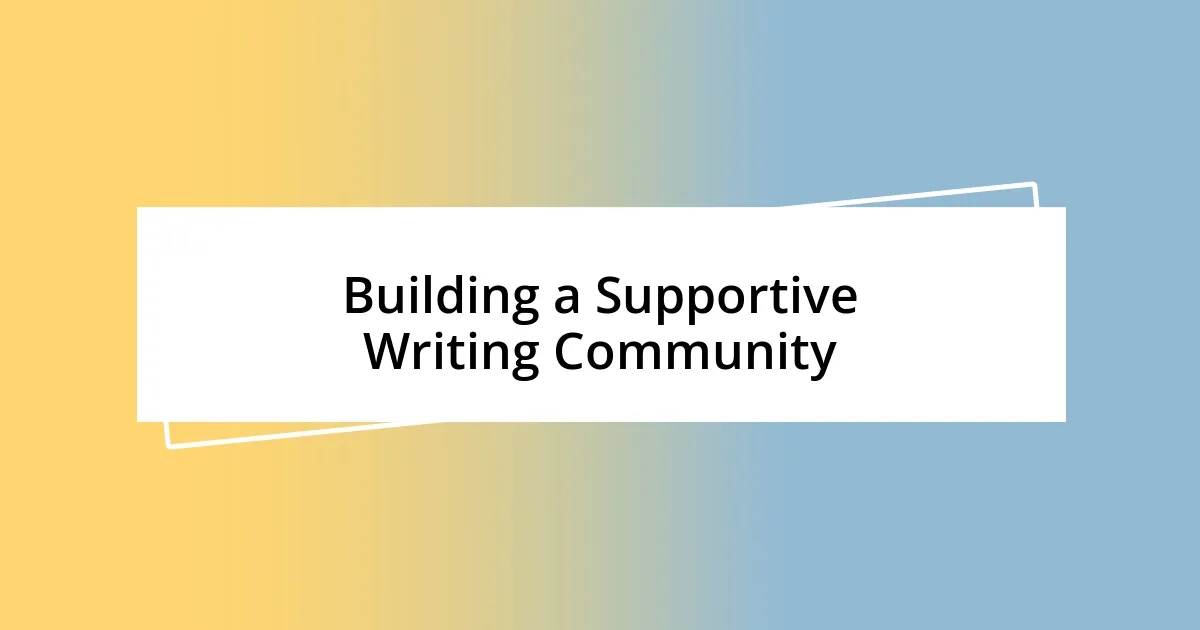
Building a Supportive Writing Community
Building a supportive writing community has been a game-changer in my writing journey. When I first joined a local writers’ group, I was surprised to find a nurturing environment where every member was eager to share their struggles and triumphs. It was comforting to know that others were facing similar challenges, and I often found encouragement in their stories. Have you ever considered how powerful it is to surround yourself with people who truly understand your journey?
In one instance, I shared a piece I felt was particularly rough, filled with uncertainties. The feedback I received not only offered constructive insight but illuminated the beauty of imperfection. It was in that moment I realized vulnerability is a connector; it fosters deep relationships among writers. I still cherish the hugs and high-fives after those sharing sessions, as they remind me that we’re all in this together, learning and growing alongside one another.
Online platforms also play a crucial role in building community. I often engage with fellow writers on social media, sharing our struggles and celebrating each other’s victories. One memorable night, I hosted an impromptu Twitter chat about writing flaws with a hashtag, and the responses flooded in—each tweet echoing support and camaraderie. Isn’t it uplifting to think that no matter where you are, you can find like-minded individuals who cheer you on?
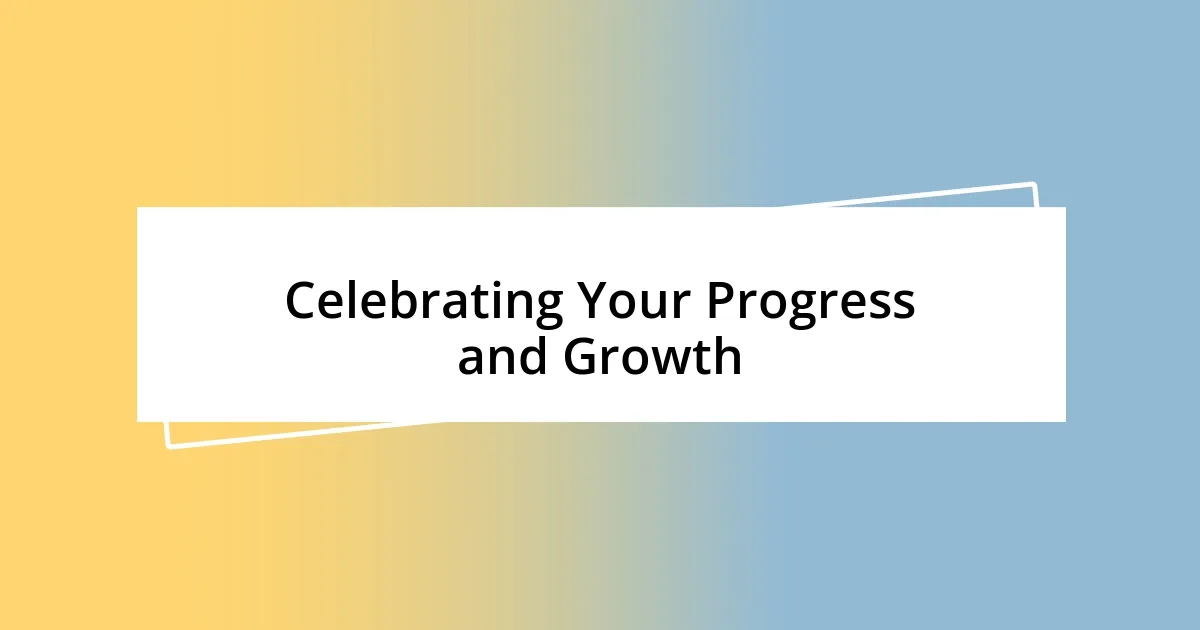
Celebrating Your Progress and Growth
Celebrating progress and growth is not just a nice idea; it’s a crucial part of the writing journey. I remember feeling exhilarated when I completed my first short story. It wasn’t perfect, but the thrill of having created something from scratch was empowering. I think it’s vital to take a moment to acknowledge those milestones, no matter how small—each represents a step forward.
One night, I reread journal entries from when I first started writing. It was fascinating to see how much I’ve evolved. I noticed that the fears I once had, like the fear of criticism or not being good enough, have faded over time. Reflecting on these changes filled me with pride and reminded me that growth doesn’t happen overnight; it’s a gradual process that deserves celebration.
Marking your progress can serve as fuel for your motivation. I often set little goals for myself, whether that’s writing for a specific amount of time each day or finishing a chapter. When I achieve these goals, I treat myself—maybe with a favorite snack or a day off to recharge. What are some ways you could celebrate your own achievements? Recognizing your growth not only boosts your confidence but makes the journey all the more enjoyable.












